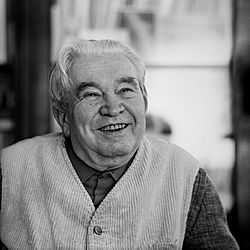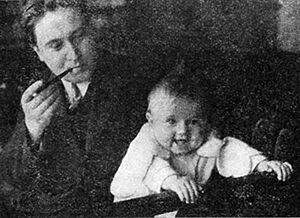Jaroslav Seifert facts for kids
Quick facts for kids
Jaroslav Seifert
|
|
|---|---|

Jaroslav Seifert 1981
photo Hana Hamplová |
|
| Born | 23 September 1901 Žižkov, Prague, Austria-Hungary |
| Died | 10 January 1986 (aged 84) Prague, Czechoslovakia |
| Occupation | Writer, poet, journalist |
| Nationality | Czech |
| Notable awards | Nobel Prize in Literature 1984 |
| Signature | |
 |
|
Jaroslav Seifert (born September 23, 1901 – died January 10, 1986) was an important Czech writer, poet, and journalist. He won the 1984 Nobel Prize in Literature for his amazing poetry. The Nobel committee said his poems were fresh, full of feeling, and very creative. They showed the strong and varied spirit of people.
Contents
About Jaroslav Seifert's Life
Jaroslav Seifert was born in 1901 in Žižkov, a part of Prague. At that time, Prague was in a country called Austria-Hungary. His first book of poems came out in 1921.
He was a member of the Communist Party of Czechoslovakia, which was a political group. He also worked as an editor for several newspapers and magazines linked to this party, like Rovnost and Sršatec. He also worked for a publishing company.
Early Career and New Ideas
In the 1920s, Seifert was seen as a leader of the "avant-garde" in Czechoslovakia. This means he was part of a group that created new and experimental art. He helped start a journal called Devětsil.
In 1929, he and six other writers left the Communist Party. They signed a public statement protesting against the party's new, very strict political ideas. After that, he worked as a journalist for newspapers and magazines that supported workers' rights during the 1930s and 1940s.
Focusing on Writing
In 1949, Seifert stopped working as a journalist. He decided to spend all his time writing poetry. His poems won important state awards in 1936, 1955, and 1968. In 1967, he received a special honor called "National Artist."
He was also the official leader of the Czechoslovak Writer's Union for a few years, from 1968 to 1970. In 1977, he was one of the people who signed Charter 77. This was a group that spoke out against the government of the Czechoslovak Socialist Republic.
Nobel Prize and Later Years
Jaroslav Seifert received the Nobel Prize in Literature in 1984. He was not well enough to go to the award ceremony himself. So, his daughter accepted the prize for him. Even though winning the Nobel Prize was a huge deal, the news was only briefly mentioned in the country's media, which was controlled by the government.
He passed away in 1986 when he was 84 years old. He was buried in a cemetery in Kralupy nad Vltavou. His burial was a quiet event, with many secret police present. They tried to make sure there were no protests or signs of disagreement from the people attending.
Jaroslav Seifert's Books
Jaroslav Seifert wrote many collections of poems throughout his life. Here are some of his well-known works:
- Město v slzách (City in Tears, 1921)
- Samá láska (Nothing but Love, 1923)
- Na vlnách TSF (On Wireless Waves, 1925)
- Slavík zpívá špatně (The Nightingale Sings Poorly, 1926)
- Básně (Poems, 1929)
- Poštovní holub (Carrier Pigeon, 1929)
- Hvězdy nad Rajskou zahradou (Stars Above the Garden of Eden, 1929)
- Jablko z klína (An Apple from the Lap, 1933)
- Ruce Venušiny (The Hands of Venus, 1936)
- Zpíváno do rotačky (Songs for the Rotary Press, 1936)
- Jaro, sbohem (Goodbye, Spring, 1937)
- Zhasněte světla (Turn Off the Lights, 1938)
- Vějíř Boženy Němcové (Božena Němcová's Fan, 1940)
- Světlem oděná (Robed in Light, 1940)
- Kamenný most (The Stone Bridge, 1944)
- Přilba z hlíny (A Helmetful of Earth, 1945)
- Ruka a plamen (The Hand and the Flame, 1948)
- Šel malíř chudě do světa (The Painter Walks Poor into the World, 1949)
- Píseň o Viktorce (A Song About Victorka, 1950)
- Maminka (Mother, 1954)
- Chlapec a hvězdy (The Boy and the Stars, 1956)
- Praha a Věnec sonetů (A Wreath of Sonnets, 1956)
- Zrnka révy (Grapeseeds, 1965)
- Koncert na ostrově (Concert on the Island, 1965)
- Halleyova kometa (Halley's Comet, 1967)
- Odlévání zvonů (The Casting of the Bells, 1967)
- Kniha o Praze (A Book about Prague, 1968)
- Morový sloup (The Plague Column, 1968–1970)
- Deštník z Picadilly (An Umbrella from Piccadilly, 1979)
- Všecky krásy světa (All the Beauties of the World, 1979, 1981?)
- Býti básníkem (To Be a Poet, 1983)
See also
 In Spanish: Jaroslav Seifert para niños
In Spanish: Jaroslav Seifert para niños
 | Jackie Robinson |
 | Jack Johnson |
 | Althea Gibson |
 | Arthur Ashe |
 | Muhammad Ali |


